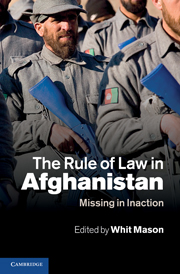Book contents
- Frontmatter
- Contents
- Contributors
- Preface and acknowledgements
- 1 Introduction
- PART I The scope and nature of the problem
- PART II The context
- PART III The political economy of opium
- PART IV Afghan approaches to security and the rule of law
- PART V International interventions
- 12 Exogenous state-building
- 13 Grasping the nettle
- 14 Lost in translation
- PART VI Kandahar
- PART VII Conclusion
- Index
- References
14 - Lost in translation
Legal transplants without consensus-based adaptation
Published online by Cambridge University Press: 01 June 2011
- Frontmatter
- Contents
- Contributors
- Preface and acknowledgements
- 1 Introduction
- PART I The scope and nature of the problem
- PART II The context
- PART III The political economy of opium
- PART IV Afghan approaches to security and the rule of law
- PART V International interventions
- 12 Exogenous state-building
- 13 Grasping the nettle
- 14 Lost in translation
- PART VI Kandahar
- PART VII Conclusion
- Index
- References
Summary
Since 2004, Afghan law has been extensively revised and amended, with heavy input from foreign jurists, including whole laws being drafted by foreigners and adopted by Afghanistan. Belatedly, the government of Afghanistan and its international partners have developed a sound mechanism for facilitating Afghan-international consultation and consensus, but most new laws are still not subjected to this process, and do not reflect Afghanistan's cultural, political and legal traditions and conditions.
Based on this experience, this chapter argues that:
foreigners cannot properly draft and revise Afghan laws by themselves, and thus even if Afghan authorities ask the foreigners to do so, any such exercise is doomed to fail;
however, foreigners can, in partnership with Afghan authorities and experts, contribute to the creation of good law, provided the procedures for drafting and review are viable and transparent, allow full representation of different expert groups, and are adhered to consistently;
only such a technical and quasi-political law reform process, which engenders consensus, may result in laws that that will be considered legitimate, and thus internalised and applied by Afghans.
Introduction
Most experts agree that the criminal justice codes and laws are now a melange of conflicting and confusing provisions, contained in various legislative pieces of disparate provenance. Conflict and confusion arise from two overlays, one horizontal and the other vertical. Horizontal conflict results from contemporaneously drafted laws whose individual ambit appears clear and non-derogative but whose provisions, when viewed systemically, actually impinge on other laws because of drafting errors.
- Type
- Chapter
- Information
- The Rule of Law in AfghanistanMissing in Inaction, pp. 266 - 298Publisher: Cambridge University PressPrint publication year: 2011
References
- 2
- Cited by



